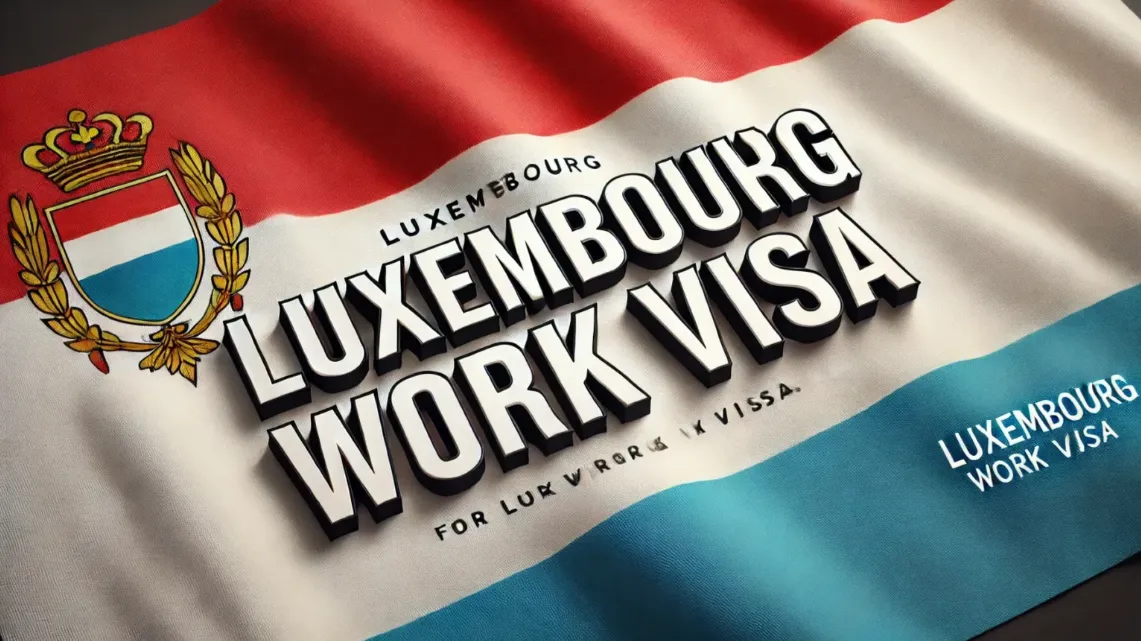Despite being one of the smallest countries in Europe, Luxembourg offers some of the most attractive job opportunities for professionals worldwide. With its strong economy, high salaries, and international work environment, it has become a preferred destination for skilled workers. The country is home to major financial institutions, multinational corporations, and a thriving tech sector, making it an ideal place for career growth. Additionally, its central location in Europe and high standard of living make it an appealing choice for expats.
- Who Needs a Work Visa for Luxembourg?
- Types of Luxembourg Work Visas
- Luxembourg Work Visa Requirements (2025 Update)
- Step-by-Step Process to Apply for a Work Visa
- Processing Time & Fees for Luxembourg Work Visa
- Work Visa vs. EU Blue Card: Which One to Choose?
- Common Reasons for Work Visa Rejections & How to Avoid Them
- Tips to Increase Your Chances of Visa Approval
- Conclusion: Your Next Steps to Work in Luxembourg
Who Needs a Work Visa for Luxembourg?
Not everyone requires a work visa to be employed in Luxembourg. Citizens of the European Union (EU), the European Economic Area (EEA), and Switzerland do not need a visa or work permit to live and work in the country. However, they must register with the local authorities upon arrival. On the other hand, non-EU nationals are required to obtain a work visa before entering Luxembourg. This visa is essential for legally working and residing in the country and must be secured before making any employment commitments.
Types of Luxembourg Work Visas
Luxembourg offers different types of work visas depending on the nature of employment. The short-term work visa is designed for individuals who intend to work in Luxembourg for up to 90 days. Those seeking long-term employment must apply for a standard long-term work visa, which allows them to stay beyond 90 days. Highly skilled professionals can opt for the EU Blue Card, which provides additional benefits, such as easier mobility across EU countries and a faster pathway to permanent residency. There is also a self-employment visa available for entrepreneurs and business owners who wish to establish their ventures in Luxembourg.
Luxembourg Work Visa Requirements (2025 Update)
To apply for a work visa in Luxembourg, applicants must meet several requirements. A valid passport is necessary, and it should be valid for at least six months beyond the intended stay. A confirmed job offer from a Luxembourg-based employer is mandatory, along with a signed work contract that meets the country’s salary criteria. Applicants must also provide proof of their qualifications and professional experience relevant to the job they have been offered. Additionally, medical insurance coverage must be arranged before the visa application process begins. Evidence of accommodation in Luxembourg is also required, ensuring that the applicant has a place to stay upon arrival.
Step-by-Step Process to Apply for a Work Visa
The first step in obtaining a Luxembourg work visa is securing a job offer from an employer in the country. Once an offer is in place, the employer must apply for a work permit on behalf of the applicant. This process involves submitting necessary documents to the Luxembourg Ministry of Foreign and European Affairs for approval. After the work permit is granted, the applicant must apply for a Type D visa at the Luxembourg embassy or consulate in their home country. Once the visa is approved, the individual can enter Luxembourg and must register with the local immigration office. The final step is obtaining a residence permit, which allows the individual to stay and work in the country legally.
Also Read: How to Secure a High-Demand Job in Luxembourg in 2025
Processing Time & Fees for Luxembourg Work Visa
The time required to process a Luxembourg work visa varies depending on the case. The work permit approval process generally takes between four to eight weeks, while the visa application at the embassy can take an additional two to four weeks. It is advisable to apply well in advance to avoid delays. The visa application fee typically ranges between €80 and €100, though additional costs may apply for document verification and legal formalities. The residence permit fee also varies depending on the applicant’s situation.
Work Visa vs. EU Blue Card: Which One to Choose?
Professionals with highly specialized skills may have the option to apply for an EU Blue Card instead of a regular work visa. The EU Blue Card offers several advantages, such as faster processing times, easier access to jobs in other EU countries, and a more straightforward path to permanent residency. However, to qualify for an EU Blue Card, applicants must have a job offer with a salary above a certain threshold and hold a recognized university degree or equivalent professional experience. For those who do not meet these criteria, a standard work visa remains the best option.
Common Reasons for Work Visa Rejections & How to Avoid Them
Work visa applications can be rejected for several reasons, which can be avoided with careful planning. Incomplete or incorrect documentation is one of the most common reasons for rejection, making it essential to double-check all paperwork before submission. Another frequent issue is an offered salary that does not meet Luxembourg’s minimum wage requirements for foreign workers. Employers must ensure that the salary aligns with government regulations. Additionally, if the employer is not authorized to hire foreign workers, the visa application may be denied. Choosing a reputable employer and ensuring all eligibility criteria are met can significantly improve the chances of approval.
Tips to Increase Your Chances of Visa Approval

To improve the likelihood of a successful work visa application, it is beneficial to target job opportunities in high-demand sectors such as finance, technology, and healthcare. Working with a visa consultant can help streamline the process and ensure that all required documents are correctly submitted. Additionally, applicants should carefully follow the instructions provided by the Luxembourg embassy or consulate to avoid unnecessary delays. Proper preparation and attention to detail can significantly enhance the chances of obtaining a work visa.
Conclusion: Your Next Steps to Work in Luxembourg
Luxembourg offers excellent career opportunities for skilled professionals, but obtaining a work visa requires careful planning and adherence to specific procedures. Securing a job, ensuring all necessary documents are in order, and applying within the required timeframe are crucial steps in successfully moving to Luxembourg for work. Prospective applicants should start their job search early and familiarize themselves with the visa requirements to make the transition as smooth as possible. With the right preparation, working in Luxembourg in 2025 can be an exciting and rewarding experience.














